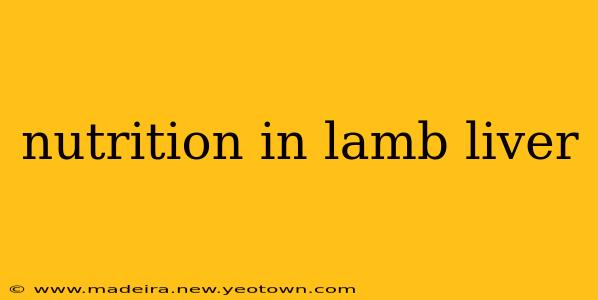Lamb liver, often overlooked in modern diets, is a nutritional powerhouse brimming with essential vitamins, minerals, and other vital nutrients. For generations, it's been a staple in many cultures, prized for its rich flavor and impressive health benefits. But what exactly makes lamb liver so special? Let's delve into the fascinating world of this often-underappreciated organ meat.
What are the Nutritional Benefits of Lamb Liver?
Lamb liver boasts an exceptionally high concentration of vital nutrients. A single serving packs a significant punch, providing substantial amounts of:
- Vitamin A: Lamb liver is incredibly rich in Vitamin A, crucial for eye health, immune function, and cell growth. A single serving often exceeds the recommended daily intake.
- Vitamin B12: Essential for nerve function, red blood cell formation, and DNA synthesis, lamb liver is an excellent source of this often-deficient vitamin, particularly important for vegetarians and vegans.
- Iron: Lamb liver is an outstanding source of heme iron, the most readily absorbed form of iron by the body. This makes it incredibly beneficial for preventing and treating iron-deficiency anemia.
- Copper: This vital mineral plays a role in energy production, iron metabolism, and nerve function. Lamb liver provides a significant contribution to your daily copper needs.
- Selenium: A powerful antioxidant that protects cells from damage, selenium is abundant in lamb liver and contributes to overall health and well-being.
- Protein: Lamb liver is an excellent source of high-quality protein, essential for building and repairing tissues, and crucial for maintaining muscle mass.
Is Lamb Liver Good for You?
Yes, lamb liver offers numerous health benefits when consumed as part of a balanced diet. Its impressive nutrient profile can contribute to:
- Improved Immune Function: The high concentrations of Vitamin A and selenium boost the immune system, making you less susceptible to illness.
- Enhanced Energy Levels: The iron and copper content contributes to efficient energy production, combating fatigue and lethargy.
- Better Eye Health: The substantial Vitamin A content is vital for maintaining good vision and preventing age-related macular degeneration.
- Improved Red Blood Cell Production: The high iron content combats anemia and ensures efficient oxygen transport throughout the body.
- Stronger Bones: The vitamin and mineral content contributes to bone health and density.
How Much Lamb Liver Should You Eat?
While lamb liver is incredibly nutritious, moderation is key. Due to its high Vitamin A content, excessive consumption can lead to hypervitaminosis A, a condition with potentially harmful effects. Experts recommend limiting consumption to a few servings per week. Always consult your doctor or a registered dietitian to determine the appropriate serving size based on your individual needs and health conditions.
What are the Potential Downsides of Eating Lamb Liver?
While generally safe, some potential downsides of lamb liver consumption include:
- High Cholesterol: Lamb liver is high in cholesterol, so individuals with high cholesterol should consume it sparingly.
- High Purine Content: Individuals with gout should limit their intake due to the high purine content.
- Potential for Toxin Accumulation: Lamb liver can accumulate toxins from the animal's environment. Choosing ethically sourced, high-quality lamb liver is crucial to minimize this risk.
- Strong Taste & Odor: Some find the strong, gamey flavor and odor unappealing.
Is Lamb Liver Safe to Eat During Pregnancy?
Lamb liver can be a good source of essential nutrients during pregnancy, but moderation is vital due to its high Vitamin A content. Excessive Vitamin A intake during pregnancy can be harmful to the developing fetus. Consult your doctor or a registered dietitian for personalized guidance.
How Can I Prepare Lamb Liver?
Lamb liver can be prepared in various ways. Searing, pan-frying, or grilling enhances its flavor while retaining its nutrients. Many culinary traditions offer unique recipes for incorporating lamb liver into delicious dishes. Experiment and find your favorite way to enjoy this nutritional powerhouse!
In conclusion, lamb liver is a nutrient-dense food that offers significant health benefits when consumed responsibly. Its rich profile of vitamins, minerals, and protein makes it a valuable addition to a balanced diet for many individuals. However, moderation is essential due to its high cholesterol and Vitamin A content. Always prioritize high-quality sources and consult your healthcare professional for personalized dietary advice.

